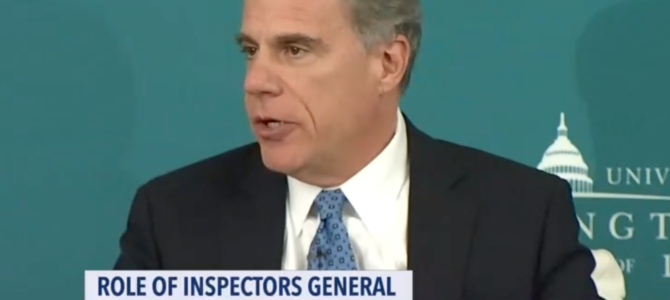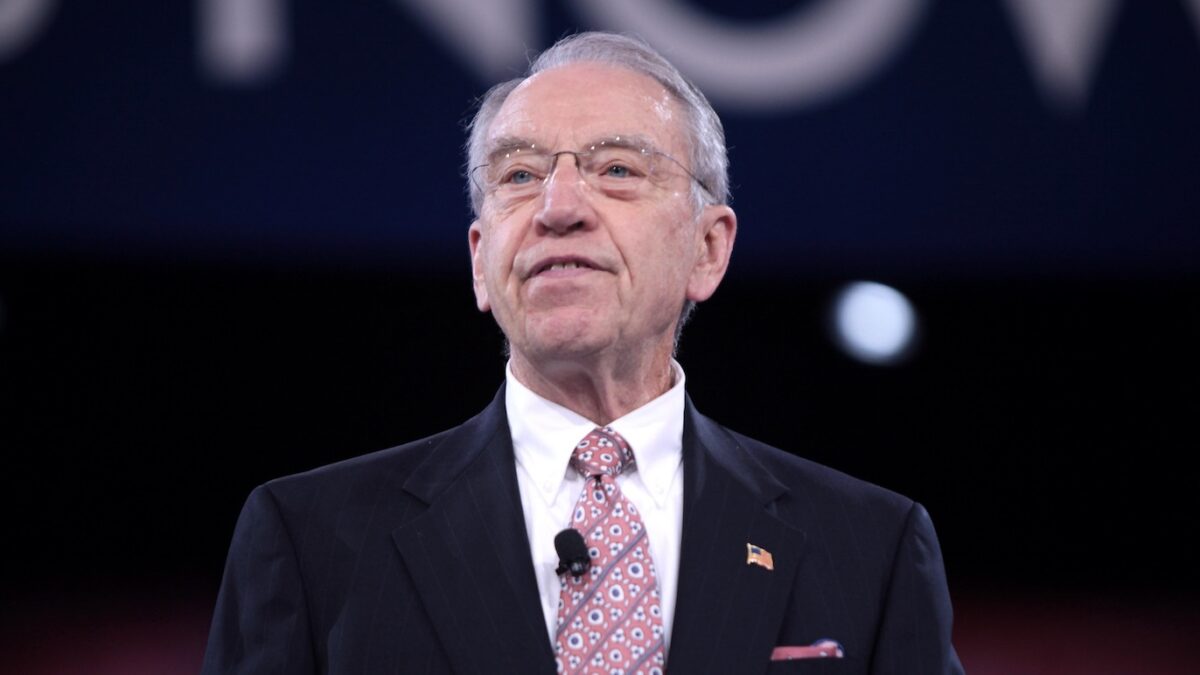
When Justice Department Inspector General Michael Horowitz released his report this week, the damning litany of civil rights abuses committed by the FBI in the report sent Trump opponents scrambling to find a silver lining. After years of defending the FBI’s conduct and integrity, that position was no longer tenable. MSNBC’s Chris Hayes noted, “I don’t think there’s anything to celebrate” in the report, but seized on the idea that Horowitz’s report didn’t establish any political motivation for the FBI’s egregious behavior. “It seems useful to have a thorough factual record of the fact that Barack Obama did not direct a rogue deep state operation to take down the Trump campaign, which has been the contention,” he added.
Some version of this narrative quickly became widespread. “The report is nothing to celebrate, the concerns it raises are real, and it should not be reduced to a soundbite,” said CNN legal analyst Renato Mariotti. “That said, it debunks many conspiracy theories and unfounded allegations made by Trump and his allies. It appears that they do not accept its conclusions.”
Elizabeth Goitein, the co-director of the Liberty and National Security Program at the Brennan Center for Justice, in an otherwise reasonable series of thoughts on FISA abuse, says, “First, the report confirms that neither the investigation generally nor the FISA applications in particular were motivated by political bias. No big surprise there; despite what Trump would have us believe, the FBI isn’t actually a bunch of bleeding-heart liberals.” Mother Jones’ Kevin Drum adopted a more reasonable-sounding summation of the report — “OIG Report Says FBI Is Incompetent, But Harbors No Anti-Trump Bias” — that reflected a lot of the nonpartisan, mainstream journalistic analysis of the report.
But despite what everyone is saying about it, the report doesn’t actually rule out political bias by the FBI. What the report actually says is, “we did not find documentary or testimonial evidence that political bias or improper motivation influenced his decision [to open an investigation surveilling the Trump campaign].” The IG report also goes on to say that political bias couldn’t be fingered as the source of decision-making because certain decisions were “reached by a consensus among the Crossfire Hurricane agents and analysts.” In terms of causality, this essentially means the FBI circled the wagons and made it hard to determine precise, documented motivations for each specific decision. Not surprisingly, the report also goes on to document repeatedly how when interviewed by the IG, key personnel either conveniently didn’t remember pertinent information or refused altogether to cooperate with the investigation.
And finally, when asked point-blank about the issue during congressional testimony Wednesday morning, Horowitz flatly stated he could not rule out political bias as a motivating the FBI.
As a result, in order to completely dismiss the idea that there was political bias at the FBI, you have to ignore Logic 101: The absence of evidence is not evidence of absence. Aside from the IG report, which is in no way definitive on this matter, plenty of other facts and evidence suggest political bias. In light of what the report says about what it did and did not conclude, the notion that the OIG report “debunks many conspiracy theories” is an obvious strawman. Nor is it remotely accurate to say the report rules out the possibility FBI employees acted out of “anti-Trump bias.”
Incompetence Might Be More Concerning
But for a second, pretend that the FBI made dozens of civil rights violations, repeatedly deceived the FISA court, and even fabricated evidence all just out of apolitical bureaucratic incompetence, and that all of these many examples of misconduct just coincidentally happened to damage Donald Trump’s campaign and presidency.
To some extent, the IG report suggests a comedy of errors is to blame for what happened: “That so many basic and fundamental errors were made by three separate, handpicked teams on one of the most sensitive FBI investigations that was briefed to the highest levels within the FBI, and that FBI officials would eventually be subjected to close scrutiny, raised significant questions regarding the FBI chain of command’s management and supervision of the FISA process.”
How, exactly, is this better than being motivated by politics? Or in any way reassuring? If a handful of people at the FBI were motivated by politics, it’s relatively easy to excise the bad actors and fix the agency. But if the internal culture at the agency is such that it encourages abuse of power and reckless behavior at the highest levels, that’s much harder to fix.
In fact, it suggests a level of incompetence far more concerning than bias. Think about it — investigating a presidential candidate is very nearly unprecedented, and even if you really believe such an extraordinary action is necessary to protect the country, you would have to be hyper-aware of the political sensitivity of the matter. Mishandling the case in any way that became public could result in a major scandal with the potential to undermine public confidence in our sacred democratic process. (Preserving the integrity of the democratic process is, ironically, the grave justification used to push so many conspiracy theories on the left regarding Trump’s election.)
And somehow, despite being aware of the many pitfalls of such politically sensitive investigation, the FBI was this slipshod and careless, making mistakes at nearly every turn? What does this say about the FBI’s respect for civil rights and honesty when it’s not a politically sensitive investigation? Is manufacturing evidence and lying to judges such standard operating procedure that it knows no other way of conducting investigations even when the stakes are this high?
It’s often true in D.C. bureaucracies that incompetence is a better explanation than malice, but believing the FBI had no political motivation in this instance is like Jack the Ripper wielding Hanlon’s razor.
The Facts Suggest Political Motivation
Of course, the operative principle in this case is Occam’s razor, not Hanlon’s. There are plenty of reasons aside from the IG report to conclude that bias was a non-trivial factor explaining much of the FBI’s incredible misconduct.
- Contrast the FBI’s handling of the Hillary Clinton email investigation in 2016 with how it handled the investigation of the Trump campaign. The Bureau handed out immunity to Clinton’s staff like it was some kind of party favor, and James Comey personally decided not to prosecute Clinton for obvious lawbreaking, even though he had no actual authority to make that decision. An IG report later blasted the FBI for mishandling the Clinton email investigation in myriad ways, but eventually concluded with a familiar refrain: “Investigators found no evidence that [former FBI Director] Comey’s conduct was motivated by ‘political bias.’” So many of the exact same FBI personnel were running both investigations, but there are no political motivations at work — it’s just a coincidence that they were too lenient on Clinton and alarmingly overzealous in their investigation of Trump?
- Text messages between FBI top counterintelligence Peter Strzok and Lisa Page, the FBI lawyer he was having an affair with, reveal the two to be personally biased against Trump and conservative voters generally. And despite their involvement in the Trump investigation, we’re required to believe this was relegated to their personal opinions and did not affect their work. Not only that, their specific discussion suggests they were trying to stop Trump from getting elected. “There’s no way he gets elected — but I’m afraid we can’t take that risk,” Strzok famously texted Page. “It’s like an insurance policy in the unlikely event you die before 40.” Strzok and Page have subsequently testified that the obvious reading of that text is inaccurate and insisted the meaning was more benign and convoluted. But the integrity of everyone involved is in doubt — aside from the affair between Strzok and Page, the “Andy” mentioned in the text is former Deputy Director Andrew McCabe, presently facing a grand jury for lying to investigators about leaking to the press. Relying on the word of such FBI officials to believe the investigation into Trump wasn’t political seems pretty credulous, and even more so after the latest IG report.
- In fact, IG Horowitz wrote in his report in June that texts by Stzrok indicate “not only indicative of a biased state of mind but, even more seriously, implies a willingness to take official action to impact the presidential candidate’s electoral prospects.” In fact, starting on page 348, he quotes this previous conclusion in his report released Monday, which suggests that many people now saying the IG definitively ruled out political bias didn’t really read the report.
- Similary, Kevin Clinesmith, the lawyer who worked for Strzok and now stands accused of doctoring an email that was submitted to the FISA court, also had anti-Trump texts. “I am so stressed about what I could have done differently,” he wrote Nov. 9, immediately after Trump’s victory. “Viva la Resistance!” he texted a few weeks later. Again, knowing Clinesmith was willing to fabricate evidence, are we to believe he was above letting his political opinions influence his professional judgment?
- Another FBI lawyer, James Baker, told Congress he met with Michael Sussmann, a partner in the Perkins Coie law firm, the same law firm that represented the Clinton campaign and was used as a go-between for the DNC and Fusion GPS to fund the discredited Steele dossier. Sussmann allegedly fed Baker opposition research that a server in Trump Tower was communicating with a Russian bank — a story that was quickly discredited when the press later aired it.
- Justice Department official Bruce Ohr was funneling information to the FBI he had obtained by dossier author Christopher Steele, while Ohr’s wife worked for Fusion GPS, which, again, was being paid by the DNC and Clinton campaign.
- At the same time the FBI keeps coincidentally meeting with and hoovering up information from sources with ties to the DNC, the FBI appears to have made little effort to inform the Trump campaign that it should take precautionary measures to address supposedly pressing concerns that it might be subject to foreign influence. Congress is currently investigating whether or not the FBI erred in not providing the Trump campaign with counterintelligence briefings as “such briefings are commonly provided to allow unwitting organizations and individuals to take defensive actions to protect themselves from threats.” To date, the FBI’s explanation of what it did and did not do to warn the Trump campaign is suspiciously opaque and cagey.
- Finally, if the genesis of the investigation wasn’t political — how do you explain, as the IG reports in detail, the bizarre continuance of the investigation and repeated renewal of FISA warrants that happened after the FBI became aware that key facts undergirding the Steele dossier and FISA application didn’t hold water? Was this just some kind of inexplicable bureaucratic inertia, or having failed to keep Trump from getting elected, was the Bureau trying to undermine his presidency?
Reasonable Conclusions
Of course, none of this is proof positive of a “deep state conspiracy” to get Trump. But seizing on the report’s failure to confirm Trump supporter’s worst suspicions is downplaying the need for FBI accountability under the cloak of blatant partisan hyperbole. And it is a convenient way to save face for those who defended the FBI’s conduct long after it should have been obvious the FBI did a great many indefensible things.
The more reasonable frame is to look at the IG report and the totality of what we know about the FBI’s conduct and ask, is it more likely than not that top FBI officials let their personal politics compel them to engage in reckless behavior that violated the civil rights of Trump campaign officials? And as a secondary but very serious concern, was that reckless behavior an attempt by FBI officials to affect the election and later hamper Trump’s presidency?
An informed citizen could very easily look at these facts and conclude one or more of these things happened. That’s why the IG report is being misrepresented to say it ruled out political motivations on behalf of the FBI when it did not. This isn’t a criminal trial — no one has to prove the FBI is guilty beyond a reasonable doubt here. (Though the IG has made a criminal referral for Clinesmith, and the Durham investigation may yet result in more FBI officials charged with crimes.) If a critical mass of the voting public decides that what the FBI did demands accountability, it could spur a reckoning that would likely embarrass many Democratic leaders and opponents of the president who were heavily invested in discredited collusion theories and found themselves justifying abuses of the awesome surveillance powers of American law enforcement.
But the truth should will out, the political consequences be damned. Trump’s critics have consistently argued that the divisive chaos of the Trump years stems from the president’s desire to elevate political narratives over reality, but it turns out they might be quick to accuse precisely because they are guilty of this same destructive impulse.









